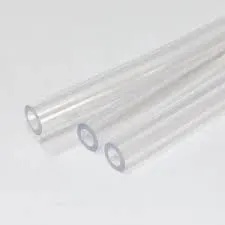Aug . 29, 2024 16:39 Back to list
High-Quality PVC Chemical Pipes for Durable Industrial Solutions
PVC Chemical Pipes An In-depth Overview
Polyvinyl Chloride (PVC) has become one of the most popular materials for manufacturing chemical pipes due to its remarkable properties that make it suitable for various applications. Known for its durability, resistance to chemicals, and cost-effectiveness, PVC is a polymer that stands out in the construction and industrial sectors.
One of the key advantages of PVC chemical pipes is their excellent resistance to a wide range of corrosive substances. Unlike metal pipes, which can rust or corrode over time when exposed to harsh chemicals, PVC maintains its integrity and performance. This attribute is crucial in industries such as chemical manufacturing, pharmaceuticals, and food processing, where the transport of aggressive solvents, acids, and bases is a common requirement.
PVC Chemical Pipes An In-depth Overview
In addition to their practical advantages, PVC pipes are also known for their longevity. With proper installation and maintenance, they can last for several decades, significantly reducing the need for frequent replacements. This durability is particularly essential for industries demanding reliable piping systems, as any failure can lead to substantial downtime and economic loss.
pvc chemical pipe

Moreover, the smooth interior surfaces of PVC pipes minimize resistance to flow, promoting efficient fluid transfer. This property is especially vital in chemical processes where maintaining specific flow rates is crucial. The smoothness also helps prevent the buildup of deposits that can obstruct flow over time, further enhancing their functionality.
From an environmental perspective, the use of PVC is increasingly viewed as favorable. Innovations in the manufacturing process have led to the production of more sustainable and recyclable PVC materials. Additionally, PVC pipes are energy-efficient to manufacture and require less energy for transportation compared to many alternatives, contributing to a lower carbon footprint.
However, it is essential to note that while PVC pipes are suitable for a wide range of chemicals, they are not universally applicable. It is crucial for engineers and project managers to conduct thorough assessments to ensure compatibility between the pipes and the fluids they will transport. Factors such as temperature, pressure, and chemical composition must be meticulously analyzed to avoid failures.
In conclusion, PVC chemical pipes provide a robust and reliable solution for various industrial applications. Their resistance to corrosive chemicals, lightweight nature, longevity, and minimal flow resistance make them an ideal choice for the transport of aggressive substances. As industries continue to prioritize sustainability and efficiency, PVC pipes will likely remain a staple in the chemical sector, combining economic viability with practicality. As technology advances, further innovations in PVC will likely enhance its applications, solidifying its place in the infrastructure of tomorrow's industries.
-
PVC Grey Sheet for Extraction: Chemical Resistant & Durable
NewsAug.19,2025
-
Durable PVC Pipe Fittings for Plumbing & Irrigation Needs
NewsAug.18,2025
-
HDPE Steel Belt Reinforced Spiral Corrugated Pipe | High Strength
NewsAug.17,2025
-
HDPE Pipe Fittings: Durable, Leak-Proof Solutions
NewsAug.16,2025
-
Premium CPVC Sheet: High-Temp & Chemical Resistant Solutions
NewsAug.15,2025
-
Durable PPR Pipe for Hot & Cold Water Systems - Easy Install
NewsAug.14,2025

